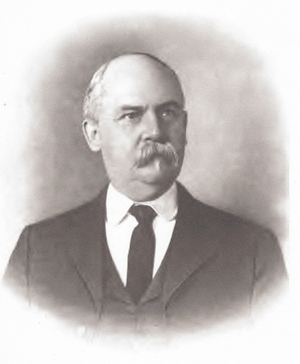Walter Clark (judge) facts for kids
Quick facts for kids
Walter McKenzie Clark
|
|
|---|---|
 |
|
| Born | August 19, 1846 |
| Died | May 19, 1924 (aged 77) |
| Resting place | Oakwood Cemetery Raleigh, North Carolina |
| Education | University of North Carolina at Chapel Hill |
| Occupation | Judge, Lawyer, Politician |
| Spouse(s) | Susan Washington Graham |
| Military career | |
| Allegiance | |
| Service/ |
|
| Rank | |
| Unit | 22nd North Carolina Infantry 35th North Carolina Infantry 70th North Carolina Infantry |
| Commands held | 6th Battalion, North Carolina Junior Reserves |
| Battles/wars | American Civil War |
| Signature | |
Walter McKenzie Clark (born August 19, 1846, died May 19, 1924) was an important North Carolina politician and attorney. He worked as a judge on the North Carolina Supreme Court. He was first an associate justice from 1889 to 1903. Later, he became the chief justice from 1903 until his death in 1924.
Contents
Walter Clark's Early Life and Education
Walter Clark was born in Halifax County, North Carolina. His parents were General David Clark and Anna M. Thorne. He went to the University of North Carolina at Chapel Hill. While there, he was a member of the Philanthropic Society. His picture is still in the Philanthropic Society's room today. New members learn about his important work for North Carolina.
Serving in the Civil War
Clark served as an officer in the Confederate States Army. In 1861, he was a Lieutenant with the 22nd North Carolina Infantry. In 1862, he became an Adjutant in the 35th North Carolina Infantry. This was all during the American Civil War.
He then went back to the University of North Carolina at Chapel Hill. He graduated at the top of his class in 1864. After graduating, he returned to the war. He became a Major, leading the 6th Battalion, North Carolina Junior Reserves. This group soon joined the 1st Junior Reserves Regiment. It was also known as the 70th North Carolina Infantry Regiment. In 1865, he became a lieutenant colonel in this regiment.
Becoming a Lawyer and Judge
In the 1870s, Clark moved to Raleigh, North Carolina. He started his own law practice there. He also wrote many books about law and history. On January 27, 1875, he married Susan Washington Graham. She was the daughter of William Alexander Graham.
In April 1885, Governor Alfred M. Scales chose Clark to be a judge. He became a judge of the superior court. Then, in 1889, Governor Daniel G. Fowle promoted him. Clark was appointed to the state Supreme Court.
Clark's Time on the Supreme Court
Clark was elected to the Supreme Court in 1890. He was re-elected in 1894. He had support from his own Democratic Party. He also had support from the Republicans and Populists.
In 1902, Clark was elected chief justice of the Supreme Court. He was re-elected several times after that. In 1912, he tried to become a U.S. Senator. He ran as a liberal reformer. However, he did not win against Furnifold Simmons. Walter Clark passed away in Raleigh on May 19, 1924. He was still serving as chief justice at the time. He was buried at Oakwood Cemetery.
Walter Clark's Family and Legacy
Walter Clark had five children. All of them went to North Carolina State University. His son, Walter Clark, Jr., is thought to be the youngest person to ever graduate from the university. Another son, David Clark, later served on the University of North Carolina Board of Trustees.
Today, Clark Dining Hall at North Carolina State University is named after Walter Clark. David Clark Labs is named after his son, David.
| Legal offices
|
||
|---|---|---|
| Preceded by David M. Furches |
Chief Justice of North Carolina Supreme Court 1903 - 1924 |
Succeeded by William A. Hoke |
 | Dorothy Vaughan |
 | Charles Henry Turner |
 | Hildrus Poindexter |
 | Henry Cecil McBay |

